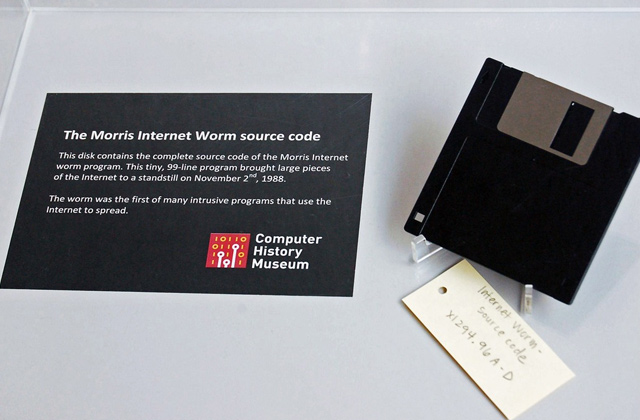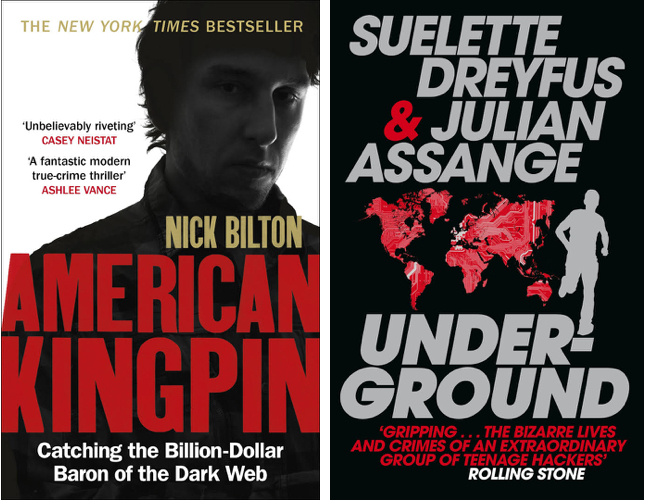While I had heard about the idea of Hacker Culture, I recently encountered this curious fact.
In a recent interview, Paul Graham the famous founder of YCombinator, was sharing the fact that his co-founder in his startup, ViaWeb which was later acquired by Yahoo was a convicted felon. His co-founder, Robert Morris, or RTM as he is more commonly known, was the creator of Morris Worm which was one of the first such worms which used the Internet to spread. RTM went on to do great things in life from becoming a prof to being co-founder of YCombinator, again with PaulG.
 The floppy disk with the source code of the Morris worm is now kept in the Boston Museum of Science
The floppy disk with the source code of the Morris worm is now kept in the Boston Museum of Science
Source: Morris Worm turns 25
What blew my mind was this: A convicted felon was the founder of a great startup (ViaWeb) and a world-leading incubator (YC). When I think about a felon, I mostly picture a person who is badass, scruffy and generally not a nice guy. But I was so wrong. It just meant that the law of the land was not advanced enough to understand what RTM was doing. It shows that law is a living creature and depends on the societal and technological context in which it operates.
Hackers are generally painted in a negative light and most people think that hackers do shady things by stealing money by sneaking into systems. Very few people see them as pioneers who are pushing the boundaries in their field, figuring out gems which push our society forward.
Paul Graham has a great book, Hackers and Painters, which tries to elucidate the opposite point of view. Hackers are similar to creative people in other domains, its just that they have chosen technology as their playing field.
I delved a bit deeper into this, primarily via two books - Underground by Julian Assange and Suelette Dreyfus and American Kingpin by Nick Bilton.
Underground talks about the stories of early hackers in Australia, USA, the UK of which Mendax(aka Julian Assange) was also part. American Kingpin focuses on the story of Ross Ulbricht, the creator of Silk Road. I plan to do a detailed review of these books sometime, but that's for another post.
 Books: American Kingpin and Underground
Books: American Kingpin and Underground
So, the hacker scene originated in the 1980s when the BBSs(Bulletin Board Systems) came into the picture. It started with phreakers messing with telephone systems to get free phone calls across the world. This opened a new world for them as they can exchange notes with people across the world and boast about their skills.
The Internet in the initial days was dominated by academic and research institutions. It was designed primarily for research institutions like NASA, universities, etc. to collaborate with each other on their projects. Hackers started getting onto such systems tinkering with the servers and information they had.
What are the primary drives which motivate hackers
- Explore and tinker with systems. Play with a system to figure out what it can or cannot do.
- "Own" a system - Gives a sense of power
- A sense of community - To meet a group of people who think like you. Enjoy the same things when normal society treats you as an outcast and you always get a sense that you don't belong there.
- Irreverence for authority - If something is forbidden by an authority, that makes it more interesting to do it.
But, the majority of the social progress belongs to such outcasts.
I can hear you asking, "Why?"
Well, creating something new needs you to have a streak of irreverence, otherwise you will be bogged down by society's questions and criticism. By default, most people think that nothing new could be done. We are programmed by evolution to conserve energy. (Remember the time when humans were hunter-gatherer and securing food was the prime worry of our ancestors! Those genes haven't yet gone away). It takes a lot more energy to examine why things are how they are and propose a better solution, which is more in sync with the current state of societal and technological progress.
The strange thing is that the way our current society is organized doesn't have anything sacrosanct about it but is just a point in the evolution of the society. It can be changed, and it will be changed
Anarchism
Wikipedia defines Anarchism as a political philosophy that advocates self-governed societies based on voluntary institutions. Anarchism holds the state to be undesirable, unnecessary and harmful.
The state is the ultimate symbol of power. By definition, citizens give up a part of their sovereignty to create a state and agree to follow the legal structure of the state. This ensures that people don't kill each other and live in relative peace.
Anarchists question this fundamental belief that state is good. They argue that though the state was designed to serve its citizens, it becomes an institution of and for itself, and people running it wield unprecedented power. This state becomes the Leviathan.
Anarchism has at roots similar beliefs which power the hacker culture. The irreverence for authority. In that sense, how right are we as a society to paint hacker culture or anarchism as impalatable concepts. Aren't these ethos fundamentally important to take our society forward in the changing technological context?
Some question which I find myself asking:
- Why India produces no great hackers? Barring a few exceptions (e.g. Yaha worm) we are severely lacking in this field.
It is unfortunate, that as a nation the most famous hacker we have is Ankit Fadia, who is, in reality, a charlatan. Some argue that it is our subservient upbringing and risk-averse training which has led to this. But, then..
- Why China, even though has similar subservient upbringing, produces lot more hackers? (Political ideology? Nationalistic drive?)
Some people argue that the next world war will be fought in the cyberspace and Zero Day exploits will be used as weapons of mass destruction. If that day really comes to pass, are we prepared to face it?
References
Underground - Julian Assange & Suelette Dreyfus
Started with BBSs and telephone phreaking, which became more and more advanced with the coming of the Internet.
American Kingpin by Nick Bilton
The core belief of Ross Ulbricht was that it should be individual's choice what they chose to put or not put in their body. He believed in libertarianism and rejected the authority of the state to meddle with drug control.
Story of NSA Whistleblower - Snowden
Risk - A film by Laura Poitras
Story of Julian Assange - The founder of Wikileaks